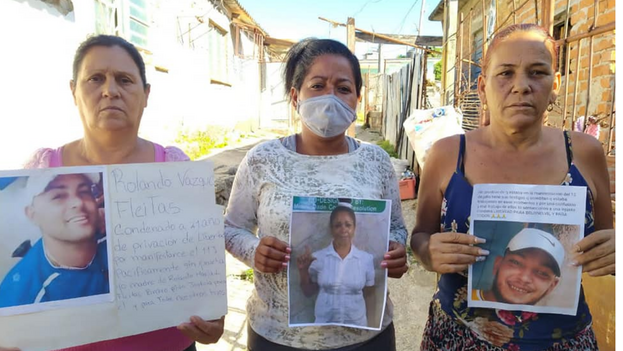
![]() EFE (via 14ymedio) Madrid, 21 February 2023 — The release of detainees in Cuba due to protests such as those of the July 2021 protests should not lead to a “forced expatriation” as in Nicaragua, several Cuban human rights organizations warned on Monday.
EFE (via 14ymedio) Madrid, 21 February 2023 — The release of detainees in Cuba due to protests such as those of the July 2021 protests should not lead to a “forced expatriation” as in Nicaragua, several Cuban human rights organizations warned on Monday.
The Cuban Observatory of Human Rights, Justice 11J and Cubalex stated that “the recent release of 222 political prisoners from Nicaragua and their immediate deportation to the United States has raised an alert in Cuban civil society about a similar ’solution’ in the current context of the Island.”
“The alert is motivated by the talks between the Cuban State and agencies such as the Catholic Church, the European Union (EU) and the Government of the United States, which have expressed positions in favor of the unconditional release of political prisoners,” says the statement, disseminated by the Cuban Observatory of Human Rights, based in Madrid.
The release of the demonstrators has become a key political issue in Cuba after Nicaragua’s precedent and the insistence on this matter by the United States, the European Union and the Vatican.
The possibility of prisoners being released for protests against the Cuban government is on the table in the context of a potential negotiation with the United States.
In this regard, these organizations recalled “antecedents” such as the release and exile in 2010 of “the majority of the political prisoners of the Black Spring” from 2003 as part of a negotiation process in the EU, and in 2015 the release of 53 others imprisoned in this case in negotiations for the restoration of relations between Cuba and the United States.
The signatories of the statement cited that the UN Human Rights Council has denounced these “forced expatriations,” which they describe as “a systematic practice in repressive governments,” and they stated that “the Nicaraguan political prisoners did not participate in the negotiation process either” nor “were they informed that the condition for their release was forced exit from their country.”
“No person, much less in the inhumane conditions of deprivation of liberty in Cuban prisons, can be forced to leave the country as a condition of their release or of definitive freedom,” they claimed.
“Whoever negotiates with the Cuban State should request guarantees that the person deprived of his liberty will make the decision to leave the country without pressure from the organs of State Security,” they added.
In addition, they demanded “the participation of people deprived of liberty and their families in the process of negotiating the exit,” along with “minimum guarantees for those who freely and voluntarily decide to leave the country, such as facilities in the relocation process to access the legalization of their immigration status.”
“We oppose laudatory pronouncements such as those issued by the US State Department, in which a human rights violation act is presented as a ’positive success’ for the consolidation of relations between countries and the path to democracy,” they stressed.
“However, we receive with hope the idea that they will be released, in any of the possible ways,” they concluded.
Translated by Regina Anavy
____________
COLLABORATE WITH OUR WORK: The 14ymedio team is committed to practicing serious journalism that reflects Cuba’s reality in all its depth. Thank you for joining us on this long journey. We invite you to continue supporting us by becoming a member of 14ymedio now. Together we can continue transforming journalism in Cuba.
